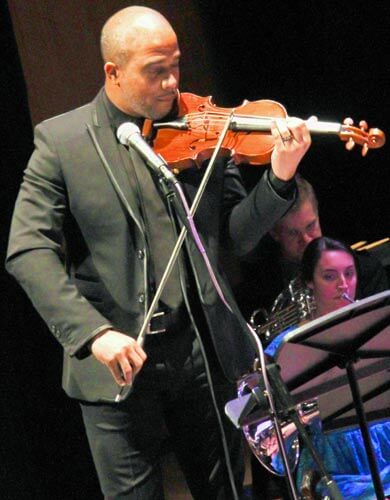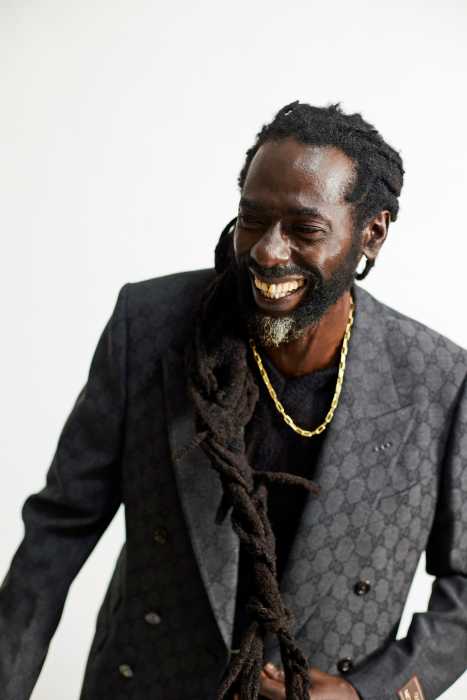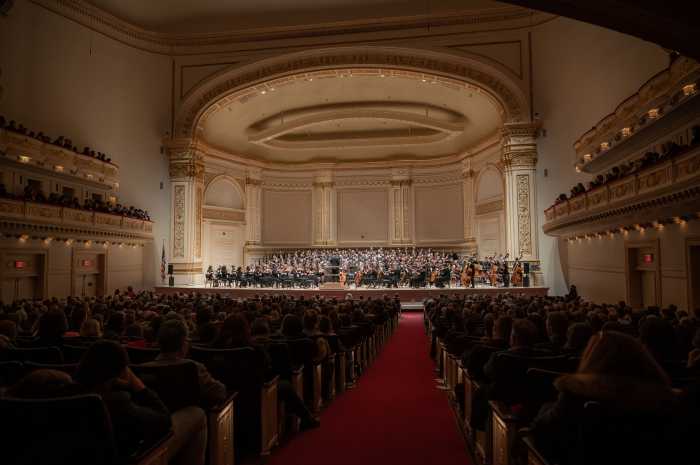April 6 begins both the beginning of Easter weekend for Christians and for Jewish people, it is the first night of the eight-day Passover holiday celebrating freedom from slavery from Egypt, the Exodus.
Haitian-American violinist and composer Daniel Bernard Roumain, known as DBR, wrapped up a one-year residency at the Jewish Community Center (JCC) in Manhattan creating “The Order of an Empty Place,” a musical interpretation to Passover and the haggadah, the text that sets forth the order of the Passover Seder. The Seder is a traditional ritual feast that is part of the holiday’s observance and in some households, this ritual can take hours.
Roumain is Catholic. He is known for collaborating across cultures and genres. The musical artist was invited to write a new work for the wind orchestra at the Clarice Smith Performing Arts Center of University of Maryland (UMD), a piece that was co-commissioned by the JCC.
The violinist’s masterful and innovative technique coupled with the UMD orchestra of 35 winds conducted by Michael Votta made for an evening last Saturday of rich, textured music and nuanced instrumentation, sometimes playful, sometimes somber. Spoken words from JCC Executive Director Rabbi Levitt and DBR were integral segments; music and text reflected each other.
Rabbi Levitt spoke about Seders past, sharing memoires and stories. She voiced ritual elements. She evoked a sense of the extreme hubbub around traditional family events. She told how her elderly father was always the Seder leader. And then came the year when he was no longer there.
DBR’s mused about fatherhood. He spoke about and to Zachary, his now, two-and-a-half year old son. He vowed to always be a part of his son’s life.
About birth, loss, and family, “The Order of an Empty Place: A Musical Haggadah” is ultimately about ritual and the circle of life.
The composer’s previous collaborator, Cleveland-based writer Margaret Lynch, distilled interviews and writings by the two into a libretto and Rabbi Levitt’s own haggadah, “A Night of Questions,” was sourced. Their words conjured images, pages from a family photo album resting on a foundation of musical interpretation.
The composer Roumain chose a religious work, in part as a reaching out to his new son whose mother is Jewish. DBR says, “I felt a particular responsibility towards the complex nature of his DNA. He is a child of black, white, Catholic, Jewish, Haitian and American parents.”
During his year residency, DBR began to understand the importance of Passover towards Jewish life and the importance of ritual and repetition in his own life and family.
Incidentally, in 2009, the year of DBR’s son’s birth, President Obama hosted the first Seder in the White House, which may be, at least for this administration, an annual tradition.
During the performance, the audience was directed to read a succinct and poetic version of the Exodus story thus symbolically bringing the actual Seder reading ritual into the theater.
Haitian saxophonist Buyu Ambroise, unfamiliar with many of the cultural references said of the night’s experience, “I loved the musicality of the piece and I learned something about Jewish ritual.”
While some audience members yearned for more musical cultural references, Roumain did include two folkloric melodies interpreted in the score. Early on, the song “Dayeinu” can be heard fragmented and re-imagined.
On leaving the auditorium, a mature Jewish woman revealed that she cried through much of the performance, it resonated so deeply.



























